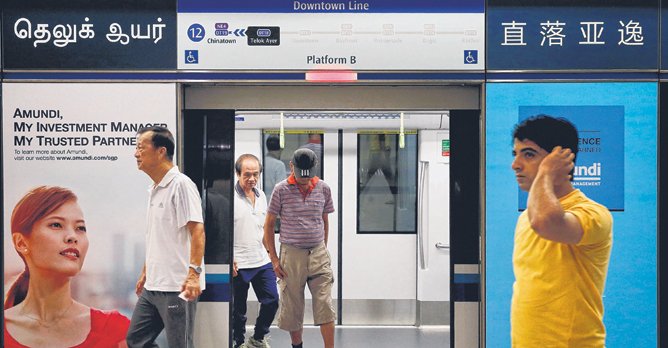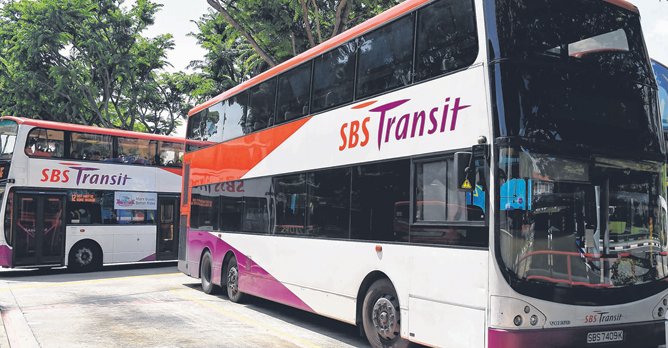SBS Transit's net profit surges 70% to record $80 million
13 Feb 2019|1,041 views
New government bus contracts introduced last year drove earnings sharply north for transport operator SBS Transit (SBST).

Revenue rose 16.1% to $1.38 billion for the 12 months to 31 December, largely because of higher fees earned with the start of the Seletar bus package in March and the Bukit Merah package in November.
Higher rail ridership from the first full-year operation of Downtown Line 3 contributed as well.
The average daily ridership for the whole line grew by 61.1% to 450,000 trips a day last year, while the North-East Line rose 2.7% to 591,000 trips a day. SBST's operating costs rose by 13.6% to $1.29 billion, with the biggest increase attributable to fuel and energy bills. Earnings per share rose from $0.15 to $0.25, while net asset value per share stood at $1.60, up from $1.44 a year earlier.
Directors recommended a final dividend of $0.07, up from $0.03 in the previous year. SBST's total equity rose by 10.9% to $498.4 million as of 31 December, fuelled by operational profits. It posted a net cash inflow of $27.4 million - from new loans raised, net cash generated from operations, and proceeds from the sale of rail assets to the Land Transport Authority under the new rail financing framework.
The firm had short-term deposits and bank balances of $32.7 million as of 31 December. After accounting for borrowings of $75 million, it had a net debt position of $42.3 million and a net gearing ratio of 8.5% - versus 39.1% as of the same time in 2017. Its gross gearing ratio was 15%, versus 40.3% as of 31 December, 2017.

It said the rail business will continue to face challenges from operating and maintenance costs, despite higher revenue expected from the 4.3% fare adjustment effective on 29 December, while the North East MRT line and Sengkang-Punggol LRT will undergo mid-life renewal of components.
SBST shares closed up $0.04, or 1.36%, to $2.98 - the highest in more than 10 years.
New government bus contracts introduced last year drove earnings sharply north for transport operator SBS Transit (SBST).

Revenue rose 16.1% to $1.38 billion for the 12 months to 31 December, largely because of higher fees earned with the start of the Seletar bus package in March and the Bukit Merah package in November.
Higher rail ridership from the first full-year operation of Downtown Line 3 contributed as well.
The average daily ridership for the whole line grew by 61.1% to 450,000 trips a day last year, while the North-East Line rose 2.7% to 591,000 trips a day. SBST's operating costs rose by 13.6% to $1.29 billion, with the biggest increase attributable to fuel and energy bills. Earnings per share rose from $0.15 to $0.25, while net asset value per share stood at $1.60, up from $1.44 a year earlier.
Directors recommended a final dividend of $0.07, up from $0.03 in the previous year. SBST's total equity rose by 10.9% to $498.4 million as of 31 December, fuelled by operational profits. It posted a net cash inflow of $27.4 million - from new loans raised, net cash generated from operations, and proceeds from the sale of rail assets to the Land Transport Authority under the new rail financing framework.
The firm had short-term deposits and bank balances of $32.7 million as of 31 December. After accounting for borrowings of $75 million, it had a net debt position of $42.3 million and a net gearing ratio of 8.5% - versus 39.1% as of the same time in 2017. Its gross gearing ratio was 15%, versus 40.3% as of 31 December, 2017.

It said the rail business will continue to face challenges from operating and maintenance costs, despite higher revenue expected from the 4.3% fare adjustment effective on 29 December, while the North East MRT line and Sengkang-Punggol LRT will undergo mid-life renewal of components.
SBST shares closed up $0.04, or 1.36%, to $2.98 - the highest in more than 10 years.
Latest COE Prices
May 2025 | 1st BIDDING
NEXT TENDER: 21 May 2025
CAT A$103,009
CAT B$119,890
CAT C$62,590
CAT E$118,889
View Full Results Thank You For Your Subscription.



















